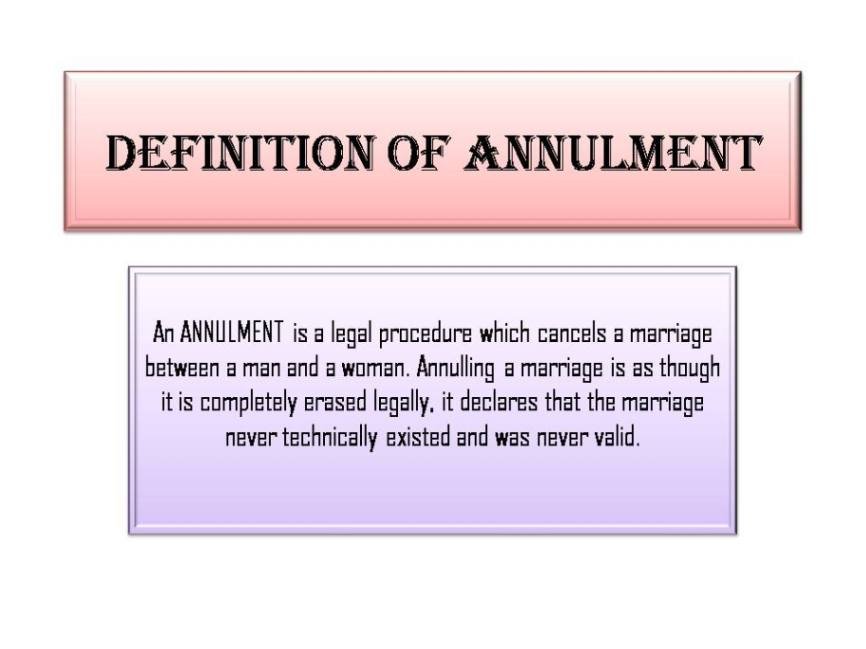Annulment of Marriage: Annulment entails declaring a marriage null or void, unlike divorce where both partners aim to end their marital union. Annulment essentially denies the existence of any such marriage between the parties.
Divorce encompasses various matters like alimony payments, child custody, interim maintenance, and related concerns, which can often be challenging to grasp. Put plainly, alimony refers to a one-time payment made by one partner during divorce proceedings, whereas interim maintenance is a court-decided sum paid at regular intervals to the spouse.
Yet, it’s crucial to recognize that the process involves complexities beyond merely asserting that a marriage is void due to a couple’s decision not to live together anymore.
To grasp the criteria for a void marriage, it’s essential to comprehend annulment, its legal framework, and its distinction from divorce. Annulment simply entails declaring a marriage as void, where a void or non-existent marriage leads to annulment.

Understanding Annulment
Annulment refers to the rejection or nullification of a marriage. It occurs when a marriage fails to meet legal requirements at the time of its inception. Annulment essentially declares a marriage that was once considered valid to be void. This distinction between void and voidable marriages might seem confusing. A void marriage is inherently null and requires no evidence or petition to declare it as such, as it never legally existed. On the other hand, in the case of a voidable marriage, one of the partners seeks a court judgment for the annulment of the marriage. Gaining clarity on this distinction is crucial, especially from a legal standpoint.
Void & Voidable Marriage
Section 5 of the Hindu Marriage Act, of 1955, elucidates a distinct contrast between a void and voidable marriage. It delineates the prerequisites for a legally recognized marriage, thereby laying the foundation for the distinction between the two types of marriages. This section comprises a total of five clauses, among which clause:
- Mandates that neither party should have a living spouse at the time of marriage.
- Requires that the individual be of sound mind and able to give valid consent.
- Stipulates that the groom must be at least 21 years old and the bride at least 18 years old.
- Prohibits the parties from falling under the degree of prohibited relationship.
- Ensures that the parties are not sapindas to each other.
Now that you’re familiar with all five clauses, understanding the distinction between void and voidable marriages becomes easier. Under Hindu Law, void marriages are those that contravene Clauses (i), (iv), and (v) of Section 5, while voidable marriages are those that contravene Clause (ii) of the same section.
If seeking the nullification of your marriage, it must meet the criteria of being a voidable marriage.
Annulment Grounds
Various grounds exist for seeking the nullification of marriage in court. those grounds are:
- If either spouse was already married at the time of the marriage.
- If either spouse lacked mental capacity at the time of marriage.
- If either spouse was under the influence of drugs and incapable of giving consent.
- If consent to the marriage was obtained through fraud or coercion.
- If either spouse is unable to engage in physical intimacy within the marriage.
- Individuals sentenced to life imprisonment are prohibited from marrying.
Annulment Laws under Indian Legislation
Legislation concerning annulment in India is encapsulated within the Indian Divorce Act and the Hindu Marriage Ac
Indian Divorce Act, 1869
Section 18 of this Act grants both spouses, the husband, and the wife, the right to file a petition for the annulment of their marriage.
Hindu Marriage Act:
Sections 5 and 12 provide definitions for void and voidable marriages respectively, along with provisions regarding the legitimacy of children in void marriages. Furthermore, the grounds for annulment are outlined within the Hindu Marriage Act.
distinction between marriage annulment and divorce.
Now that we’ve clarified the concepts of void and voidable marriages, let’s explore the distinction between marriage annulment and divorce.
| Marriage Annulment | Divorce |
| Annulment essentially denies the existence of the marriage in question. | Divorce brings an end to the current marriage. |
| Following the annulment, the marital status transitioned to single. | There is a provision for spousal maintenance and alimony in divorce proceedings. |
| In the event of marriage annulment, no alimony or spousal maintenance can be demanded. | There is provision for spousal maintenance and alimony in divorce proceedings. |
| Marriages classified as both void and voidable are eligible for annulment. | Divorce can be either through mutual consent or contested proceedings. |
Frequently asked questions
What is the difference between marriage annulment and divorce?
Marriage annulment involves declaring a marriage null or void, essentially negating its existence. In contrast, divorce terminates an existing marital status.
How does alimony differ between annulment and divorce?
In an annulment, alimony or spousal maintenance may not be mandated, whereas, in divorce, it’s often a part of the settlement, depending on various factors such as the duration of the marriage and financial circumstances.
What are the grounds for marriage annulment in India?
Grounds for marriage annulment in India may include bigamy, lack of mental capacity, coercion, fraud, physical incapacity, and legal prohibitions.
What laws govern marriage annulment in India?
Marriage annulment in India is governed by laws such as the Indian Divorce Act and the Hindu Marriage Act, which provide procedures and grounds for annulment.

























